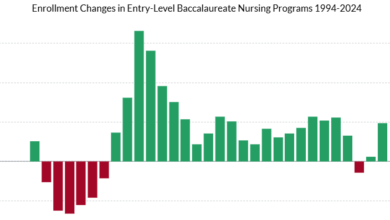Scotland to commission review into mental health nursing

The Scottish Government will commission a review into mental health nursing in the country, to explore what needs to be done to attract, grow and support the workforce, it has been announced.
The review was just one of several commitments laid out in the Scottish Government’s new Mental Health and Wellbeing Workforce Action Plan, published yesterday.
“The review into mental health nursing in Scotland provides much needed recognition of the role nursing plays in Scotland’s mental health services”
Eileen McKenna
The plan sets out actions that the Scottish Government will take over the next 18 months to deliver on priorities identified in its Mental Health and Wellbeing Strategy – published in June this year.
It comes as a recent Audit Scotland report into adult mental health provision revealed that vacancies for mental health nurses had more than doubled between March 2017 and March 2023, and the turnover rate has reached a record high.
In addition, the audit found 9% of all registered mental health nursing posts within NHS Scotland were vacant by the end of June 2023.
The new mental health workforce plan has unveiled the first phase of action to tackle some of the key issues facing the mental health and wellbeing workforce. It is set to be reviewed after 18 months and updated in 2025.
The report noted that attracting people to work in roles across mental health and wellbeing, including mental health nursing, remained a great challenge for the Scottish Government.
Meanwhile, it added that there was also a need to address challenges around high vacancy levels, retention and training issues facing certain parts of the workforce, especially in mental health nursing.
As such, the government announced that it will commission a review into mental health nursing in Scotland, which it said will “consider what more needs to be done to attract, grow, support and develop the mental health nursing workforce and leadership”.
This review will be supported by the role of the newly established ministerial Nursing and Midwifery Taskforce, which the plan said would address some of the key issues facing the nursing workforce in Scotland and improve working conditions for staff.
Meanwhile, Scotland also faces problems around recruiting students to undergraduate nursing programmes, with a 19% drop in the number of applicants to nursing courses in the country this year.
The Scottish Government said in the mental health workforce plan that it will, therefore, scope and promote existing and alternative pathways to try and widen access to mental health careers beyond traditional university and college routes.
This will include exploring promoting mental health careers to those in senior phases of school education, as well as developing targeted recruitment campaigns.
These, the plan said, would “seek to increase the diversity of the mental health and wellbeing workforce” including attracting people from remote and rural areas, and with lived experience of mental health.
Separately, the Scottish Government unveiled actions around improving mental health and wellbeing training for staff.
The plan noted that there was a need to address stigma and discrimination relating to poor mental health through training, particularly around stigma faced by people with protected characteristics and marginalised groups.
The government said it would continue to provide additional funding to NHS Education for Scotland for mental health education and training, especially on topics like perinatal, substance misuse, learning disabilities and neuro-developmental disorders.
It added that it would also fund training to increase knowledge, skills and awareness of suicide prevention, as well as expanding knowledge about self-harm.
Separately, the government highlighted in the new plan that the mental health and wellbeing workforce needed to be “valued and rewarded for the work they do”.
Part of this involves supporting staff to work at the top of their competencies, as well as ensuring there are structured career pathways with opportunities for development, the plan said.
As such, the Scottish Government is set to be implement a band 2-4 framework for mental health nursing, to encourage support staff to consider a job in the field.
Meanwhile, it said it would work with the Open University to target staff in Band 2-4 roles and promote mental health nursing careers.
The government said it also intended to continue with its programme around transforming roles within nursing and midwifery, including the development of specialist and advanced practice in mental health.
The Royal College of Nursing in Scotland, which has been a key stakeholder in the development of the new plan, welcomed its publication.
However, it also said it was disappointed that it did not set out any costings for how these actions would be implemented.
The associate director for nursing, policy and professional practice at RCN Scotland, Eileen McKenna, said: “Demand for mental health services continues to increase.
“The review into mental health nursing in Scotland provides much needed recognition of the role nursing plays in Scotland’s mental health services,” she said.
Ms McKenna warned that, while mental health nurses were highly skilled clinicians working across a variety of services in Scotland, “there simply aren’t enough of them”.
She added: “Scottish government must ensure their review aligns with the work of the ministerial Nursing and Midwifery Taskforce.
“These are critical for achieving a mental health nursing workforce that can meet increasing need and must deliver positive change for nursing staff and the people they care for.”






